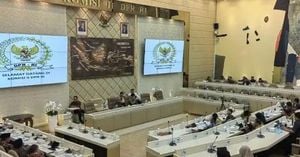Recent comments by entrepreneur Elon Musk sparked confusion when he claimed to have discovered 150-year-old individuals collecting Social Security benefits. Musk, who allegedly employed his team at DOGE for this investigation, suggested there were instances of dead individuals receiving Social Security checks, making it sound as if it were indicative of widespread fraud. This has since been clarified; the so-called '150-year-olds' are, startlingly enough, very much alive but recorded incorrectly due to technological snafus within the Social Security Administration (SSA).
The problem lies not with the recipients of the benefits but rather with the SSA’s outdated computer systems. These systems famously run on the COBOL programming language, one of the oldest programming languages still in use today. According to reports, these antiquated systems lead to bizarre date representations. Specifically, if Social Security lacks certain birthdate information, it defaults to displaying May 20, 1875. Consequently, people whose birthdates are unrecorded appear to be 150 years old!
The humor of the situation is not lost on observers. It was noted, "Those bright MAGAheads would notice ALL those 150-year-olds have THE SAME BIRTHDAY: May 20, 1875." The implication, of course, is clear: no one is actually born on the same day, but the record-keeping system fails to accurately reflect the reality of individuals' lives. This quirk of technology has led to the misinterpretation of the data Musk's team encountered.
This reliance on decades-old systems to manage one of the most significant government services raises significant concerns. The SSA’s technology is criticized widely; accusations suggest it has not been updated to match the demands and realities of the modern digital age. Each time information is processed, the errors cascade, leading to not just confusion but also potentially unjust actions taken against beneficiaries.
To understand why these individuals appeared to be 150 years old, one must look at the history of how the SSA manages its records. The date May 20, 1875, marks the foundation of the International Bureau of Weights and Measures. The SSA adopted this historical date as part of the COBOL programming standards, which were established for consistency across various systems. This means when no date of birth is logged, the default date teachers programms pick kicks back, and the peculiar phenomenon of '150-year-olds' ensues.
While Musk may have been making jokes, the underlying issue is serious. The SSA has been struggling to secure its systems effectively. Cybersecurity experts have raised alarms about the vulnerability of such outdated technologies. Surely, there’s no denying this does not paint a flattering picture of how taxpayer dollars are managed. There are growing calls for modernization to secure citizen data, improve data accuracy, and close existing loopholes.
Organizations and policymakers across the nation are now recognizing the urgency of rectifying this technology gap. A shift toward more secure, modern programming languages and practices would not only resolve these bizarre phenomena but also protect against potential cybersecurity breaches. After all, if the systems are struggling to interpret birthdates correctly, what else are they overlooking?
The conversation around these pressing issues reveals much about how government systems cope (or fail to cope) with the technological advancements shaping our lives today. It acts as a wake-up call, utilizing the absurdity of Musk’s claim as leverage to shine light on the systemic failures needing immediate addressing.
The Social Security Administration’s technological overhaul may very well be on the horizon, but for now, debates and discussions are igniting interest. Perhaps, just perhaps, this 'finding' will push advancements forward, allowing the SSA to finally close the chapter on its 150-year-old problem.



